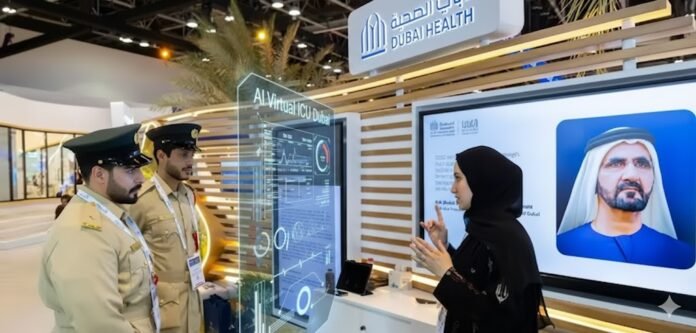AI Virtual ICU Dubai System for Enhanced Monitoring
In the ICU, every moment matters, and the staff must be alerted at all times. But what if there was a quiet and unrelenting sentinel, a Watcher, capable of monitoring for signs of an ICU patient in distress long before a human one might notice? This is what drives Dubai Health to explore the use of Virtual ICU, the first instance of the use of AI in patient monitoring in Dubai Health’s critical care units. This groundbreaking technology is known as AI Virtual ICU Dubai.
As part of the first phase of GITEX Global 2025, a showcase of Dubai Health’s most recent work, this ambitious project is in the pilot stage at Al Jalila Children’s Hospital. It is much more than a remote view camera; it is an advanced visual analytic tool that integrates with clinical data to ensure that, in real time, no critical change goes unmonitored.
All-Seeing Eye of the Virtual ICU
Think of a technology that watches a patient beyond beeping machines. The Virtual ICU uses specialized AI-powered cameras integrated with the health authority’s unified electronic medical record system, Salama. Hend Majed Al Abbar, Director of the AI Enablement Department at Dubai Health, describes the system’s remarkable potential. “These cameras track patients’ movements and watch their faces and skin to assess changes over time,” she says. The AI Virtual ICU Dubai system watches and immediately alerts the medical team when a significant change occurs, and the medical team responds.
This is a significant step change from traditional monitoring. AI technology combined with continuous vital sign monitoring – heart rate, blood pressure, and more – substantially improves patient care by combining visual monitoring with empathy. Al Abbar emphasizes the goal: improving patient care through the use of monitoring technology. “AI lets us detect distress sooner and take action to improve outcomes for patients,” she says, which demonstrates a partnership with AI and technology to improve patient outcomes in a clinical environment. The integration of AI Virtual ICU Dubai represents a key step forward.
The ten-bed pilot program at Al Jalila Children’s is even benefiting from international expertise. The National Children’s Hospital in Washington, D.C. has specialists remotely monitoring the program to ensure 24/7 surveillance, program knowledge transfer, and collaborative validation of the program’s technology. This collaboration is indicative of the global respect bestowed on Dubai’s dedication to excellence in all aspects of service.
Improving Critical Care Efficiency with AI Virtual ICU Dubai
Among the most important aspects of the AI Virtual ICU Dubai is how it can improve the potential efficiency of critical care. The prospect of documenting and monitoring critical data and the resulting quick recognition of critical changes to the patient’s condition facilitates patient safety. For patients with life-threatening conditions, the capability to respond swiftly to threats is a decisive factor in reducing the length of stays and improving survival. The technology is modeled on the success and standards of virtual care already implemented in leading hospitals in the US. This shows that Dubai is adopting global best standards in digital health technology, thanks to systems like the AI Virtual ICU Dubai.
The system is expected to go fully live in December 2025. The results of this initial deployment of AI Virtual ICU Dubai will be critical in determining the system’s expansion to other ICUs in Dubai’s integrated network of hospitals. This expansion will solidify the role of AI Virtual ICU Dubai in the region.
AI and Beyond: The New Impact of Dubai Health
Dubai Health’s AI integration journey is now being beginning with new digital innovation. This is in fulfillment of the Dubai Social Agenda 2030 and the Dubai Digital Strategy. The lessons learned from implementing the AI Virtual ICU Dubai are being applied across other projects.
The Verify AI app created by Dubai Health shows impressive uses of AI technology. It is currently being tested at Nad Al Hamar and Al Barsha Clinics and is able to identify respiratory illnesses by analyzing the symptoms cough and breath sounds. This collaboration, built with Dubai Future Solutions’ Prototypes for Humanity founding partners, is focused on assessing the app’s predictive capability with an emphasis on research and technology using real-world data.
For future doctors, Dubai Health is also launching Agentic AI for MBRU admissions. This conversational generative AI talks virtual admissions to Mohammed Bin Rashid University of Medicine and Health Sciences (MBRU) and answers complicated queries about registration, scholarships, and requirements, and offers 24/7 help via chat and voice. This ensures that students considering admission to the school get a better experience.
Different projects from the calm of the ICU, where AI Virtual ICU Dubai operates, to the hustle of the admissions office demonstrate how much Dubai Heath values the use of innovative AI across all its sectors. Dubai Health plans on incorporating smart technology to continually offer every resident and patient in the emirate technology advanced and highly safe health care provision and encounters. The success of the AI Virtual ICU Dubai pilot is a testament to this commitment.



